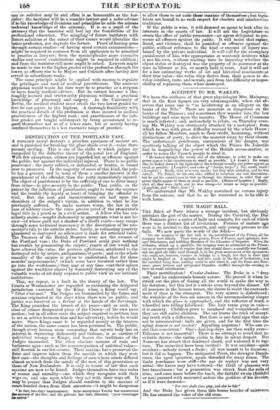DESTRUCTION OF THE PORTLAND VASE.
A roolasu rascal destroys a priceless specimen of ancient art, and is punished for breaking the glass shade over it—value three pounds sterling. This is one of the shifts to whichjudges are compelled by the defective theory of the, penal law of England. With few exceptions, crimes .are regarded.not as offences against the public,• but against the individual injured. There is no public prosecutor : the party robbed, or defrauded, or beaten, is bound over.to, prosecute. In the majority of eases of this kind, the pub- lic has a. greater, and in none of them a smaller interest in the punishment of the offender, than the party immediately injured. The object of punishment is by the suffering of one to deter many from erune--to give security to the public. That public, as the gainer by the infliction of punislunent,eught to bear the expense and the trouble (by deputy at least) of bringing the offender to trial. But the cost and inconvenience are laid upon the shoulders of the culprit's victiin, in addition to what he has previously suffered. To make matters worse, the -law- in -the' case of robbery elects the same precise proof of the prosechtor's le al title in a penal as in -a civil action. A fellow who has ma- y stolen—sought dishonestly to appropriate what is not his owi—of whose guilt not a shadow of a doubt exists—may escape throngh-some.technical inaccuracy in the description, of the pro- secutor's title to the articles stolen. Lastly, in estimating property lundered or destroyed no allowance is made for.artistical v.alue. The Trustees of the British Museum were not the owners of the -Portland vase ; the Duke of Portland could gain nothing hut tronhle by.proseeuting the culprit; courts of law would not have allowed the value, the return affectionis, attributed to the destroyed relic by artists, antiquarians, or poets; and so the whole rascality of the empire is given to understand, that for three months' imprisonment, (which some have incurred rather than go into the workhouse,) they may at any time vent their, spleen against-the wealthier classes by wantonly.destroying any of the valuable works of art daily exposed to public view in our national institutions.
This, • we 'repeat, is a fault in the theory .of the law. The Courts at Westminster are regarded as exercising the delegated jurisdiction exercised by the King, when a King could say, ' Pleat c'est moi." The Judges are trammelled by the forms and maxims originated in the days when there was no public, and justice was received as a favour at the hands of the Sovereign. The King punished the breach of his peace—and as such, the class of crimes designated pleas of the Crown—of his own mere motion ; but in all other cases the subject required to petition him to act as arbiter between him and his adversary, before he would move. Since Kings came to be regarded merely as the trustees of the nation, the same course has been persisted in. The public, though every human atom composing that mystic body has an interest in repressing dishonesty and violence, is as careless of individual wrongs as Kings, and leaves the traditions of the Judges nnassailed. The other obsolete notions of rude and barbarous ages—such as the non-recognition of artistical value— still flourish in our law-courts. Their maxims have preserved the form and impress taken from the moulds in which they were first cast—the thoughts and feelings of men whoseminds differed almost as much from the minds of the men of this generation as those:of New Zealanders. It is only in courts of law that such maxims are new to be found. Judges themselves have two codes of reason and morality—one which they recognize with their wigs on, and one upon which they act with their wigs off. It may be-proper that Judges • should conform to the maxims of courts handed down from their ancestors—it might be dangerous fact; two days' imprisonment. Some sac:etymons Vandal has transmitted the smowit of the fine; and the prisoner has been liberated, "pour encourager lea stave to allow them to set aside these maxims of themselves ;hut legis- lators are hound-to- no such respect for obsolete and• mischievous ,traditions.
If the public is wise, it will demand an agent to look after its interests in the courts of law. It will ask the Legislature eta' create the office of, publieprosecutor—a.n agent delegated to pro- seoute all offences against the public. It will insist that rapine, fraud, and violence, shall be punished as offences against the public, without reference to the kind or amount of injury sus- tained by the private individual. It will call for the exemplary punishment of him who appropriates or wantonly destroys what, is not his own, without wasting time in inquiring whether the object stolen or destroyed was the property of its possessor at the time in liferent or fee, or merely- held in trust. And it will ask for a law estimating works of art and historical muniments at their,true value—the value they derive from their power to de- velop intellect, taste, and morals, and from the difficulty.or of 'replacing them when destroyed.


























 Previous page
Previous page